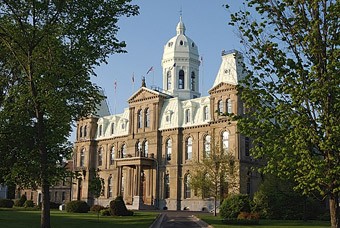Reducing taxes must be part of New Brunswick budget

This column was published in the New Brunswick Telegraph-Journal on March 5, 2020.
The upcoming provincial budget in New Brunswick requires vision. The question is whether Premier Blaine Higgs and Finance Minister Ernie Steeves will seize the opportunity to present a forward-looking budget or let the same tired, old policies will creep back in.
The government is off to a good start. Higgs and Steeves have made a clear effort to reduce the debt and run true surpluses. The choices required aren’t easy and the government is making great progress.
The province is $13.8 billion in debt – about $17,800 per New Brunswicker – and debt interest payments will have burned through $658 million in 2019-20. The good news: those numbers are all smaller than they were last year. But there’s still plenty of climbing required to get out of the debt hole.
A recent Conference Board of Canada report stated, “the loudest sound of the 2020s may be the ticking of the demographic time bomb,” with working Canadians feeling increased pressure to carry the costs of supporting the aging population.
This will be magnified across Atlantic Canada, as the growth in all four provinces is predicted to slow from last year.
To be forward-thinking, the government has to reduce the debt more aggressively.
For this, spending needs to be constrained. Consolidating schools and hospitals where possible, keeping education spending in pace with enrolment and welcoming partnerships with independent service providers can save considerable money, with the goal of maintaining or improving service quality.
This budget should end the wasteful double bureaucracy based on language and it needs to show corporate welfare the door.
If subsidies to corporations were the key to prosperity, every New Brunswicker would have a job. Last year, the government was right to cut the budget of Opportunities New Brunswick. Now it’s time to scrap it.
A welcoming environment, unencumbered by high taxes and costs, is what will attract entrepreneurs – not a government agency.
And by reducing taxes, the government can actually take in more money.
A 2019 University of Calgary study showed that a reduction in New Brunswick’s general business income tax rate would actually increase total tax revenues in the long run. This research suggests that 5.7 per cent would be the ideal rate – a far cry from New Brunswick’s 14 per cent.
Neighbouring Nova Scotia is reducing its business income tax rate in April from a crippling 16 per cent down to 14 per cent. To become a success story, New Brunswick should follow suit but be much, much bolder.
New Brunswick can look to other jurisdictions that have experienced significant financial challenges and lowered their business taxes with great success.
In the 2006-07 budget, Saskatchewan’s NDP government announced the reduction of the business income tax from 17 to 12 per cent.
“These business tax cuts will help build a better future, by making our economy more competitive, and by encouraging business to invest more and create new jobs here at home,” former NDP finance minister Andrew Thomson said. And he was right.
Saskatchewan began to lead the country in economic growth, with the province’s GDP growing by about 60 per cent from 2006 to 2011.
The business tax cuts also increased the government’s revenue. Saskatchewan collected $382 million in business taxes in 2005-06 before the rate fell. By 2008-09, Saskatchewan’s business tax rate was down to 12 per cent, and the government’s business income tax take had increased to $593.5 million.
In the next two years, business income tax revenue soared to $880.2 million, then $1.15 billion.
Similarly, a recent Fraser Institute report notes that prior to the economic reforms undertaken in Ireland beginning in the 1990s, that country lagged.
Ireland dramatically reduced its general business tax rate, first from 40 per cent to 26 per cent in one year, then to 12.5 per cent (about half the rate of comparable European countries), and reduced its top marginal income tax rate by 14 points.
Ireland’s per-person GDP was two-thirds of Canada’s in 1990 and grew to match Canada’s just ten years later. Today, the small nation boasts one-and-a-half times Canada’s per-person GDP.
This is the kind of bold policy needed from the New Brunswick government – designed to draw attention from investors.
That’s why the New Brunswick government should lower the general business income tax to five per cent.
It would send a strong message.
Alberta is currently lowering its business tax from 12 per cent to eight per cent over four years. New Brunswick should be even bolder.
Job growth will be key to the province’s prosperity. But all taxpayers need relief.
New Brunswickers pay some of the highest taxes in Canada. Cutting income taxes by 10 per cent would save New Brunswick taxpayers $185 million per year. Increasing the basic personal amount (the amount of income on which every taxpayer pays no income tax) would help low-income individuals in particular.
Higgs has already started making great progress. He needs to keep that going. To really kickstart economic growth in the province, the upcoming budget needs to deliver lower debt and lower taxes.
Paige MacPherson is Atlantic Director of the Canadian Taxpayers Federation.